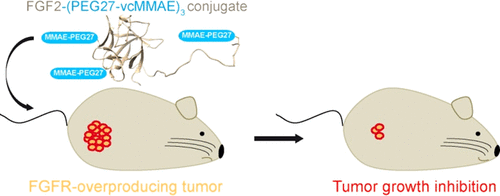当前位置:
X-MOL 学术
›
Biomacromolecules
›
论文详情
Our official English website, www.x-mol.net, welcomes your feedback! (Note: you will need to create a separate account there.)
Fibroblast Growth Factor 2 Conjugated with Monomethyl Auristatin E Inhibits Tumor Growth in a Mouse Model
Biomacromolecules ( IF 6.2 ) Pub Date : 2021-09-20 , DOI: 10.1021/acs.biomac.1c00662 Mateusz A Krzyscik 1 , Malgorzata Zakrzewska 1 , Vigdis Sørensen 2, 3 , Geir Frode Øy 4 , Skjalg Brunheim 4 , Ellen M Haugsten 3, 4 , Gunhild M Mælandsmo 4, 5 , Antoni Wiedlocha 3, 6, 7 , Jacek Otlewski 1
Biomacromolecules ( IF 6.2 ) Pub Date : 2021-09-20 , DOI: 10.1021/acs.biomac.1c00662 Mateusz A Krzyscik 1 , Malgorzata Zakrzewska 1 , Vigdis Sørensen 2, 3 , Geir Frode Øy 4 , Skjalg Brunheim 4 , Ellen M Haugsten 3, 4 , Gunhild M Mælandsmo 4, 5 , Antoni Wiedlocha 3, 6, 7 , Jacek Otlewski 1
Affiliation

|
Worldwide, cancer is the second leading cause of death. Regardless of the continuous progress in medicine, we still do not have a fully effective anti-cancer therapy. Therefore, the search for new targeted anti-cancer drugs is still an unmet need. Here, we present novel protein–drug conjugates that inhibit tumor growth in a mouse model of human breast cancer. We developed conjugates based on fibroblast growth factor (FGF2) with improved biophysical and biological properties for the efficient killing of cancer cells overproducing fibroblast growth factor receptor 1 (FGFR1). We used hydrophilic and biocompatible PEG4 or PEG27 molecules as a spacer between FGF2 and the toxic agent monomethyl auristatin E. All conjugates exhibited a cytotoxic effect on FGFR1-positive cancer cell lines. The conjugate with the highest hydrodynamic size (42 kDa) and cytotoxicity was found to efficiently inhibit tumor growth in a mouse model of human breast cancer.
中文翻译:

成纤维细胞生长因子 2 与 Monomethyl Auristatin E 结合抑制小鼠模型中的肿瘤生长
在世界范围内,癌症是第二大死亡原因。尽管医学不断进步,我们仍然没有完全有效的抗癌疗法。因此,寻找新的靶向抗癌药物仍然是一个未满足的需求。在这里,我们提出了新的蛋白质-药物偶联物,可抑制人类乳腺癌小鼠模型中的肿瘤生长。我们开发了基于成纤维细胞生长因子 (FGF2) 的偶联物,具有改进的生物物理和生物学特性,可有效杀死过度产生成纤维细胞生长因子受体 1 (FGFR1) 的癌细胞。我们使用亲水性和生物相容性 PEG4 或 PEG27 分子作为 FGF2 和毒剂单甲基 auristatin E 之间的间隔物。所有缀合物都对 FGFR1 阳性癌细胞系表现出细胞毒性作用。
更新日期:2021-10-12
中文翻译:

成纤维细胞生长因子 2 与 Monomethyl Auristatin E 结合抑制小鼠模型中的肿瘤生长
在世界范围内,癌症是第二大死亡原因。尽管医学不断进步,我们仍然没有完全有效的抗癌疗法。因此,寻找新的靶向抗癌药物仍然是一个未满足的需求。在这里,我们提出了新的蛋白质-药物偶联物,可抑制人类乳腺癌小鼠模型中的肿瘤生长。我们开发了基于成纤维细胞生长因子 (FGF2) 的偶联物,具有改进的生物物理和生物学特性,可有效杀死过度产生成纤维细胞生长因子受体 1 (FGFR1) 的癌细胞。我们使用亲水性和生物相容性 PEG4 或 PEG27 分子作为 FGF2 和毒剂单甲基 auristatin E 之间的间隔物。所有缀合物都对 FGFR1 阳性癌细胞系表现出细胞毒性作用。



























 京公网安备 11010802027423号
京公网安备 11010802027423号